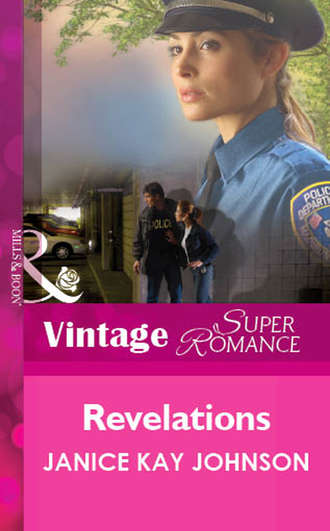
Полная версия
Revelations

“You want to know why I try to
look and act like a man?”
Ann’s tone was hard as she continued. “Well, I’ll tell you. A woman has to be tough to be a cop. Any show of softness hurts her effectiveness and her career. If I want to be soft, I do so out of the public eye.”
Diaz’s voice had the velvet undertone she’d heard him use on other women, but never her. “I’m not the public.”
“You’re one of those people who questions how tough I am every day.”
“What in hell gave you that idea?”
“Do you remember what you said to me after I was assigned to work with you?”
Brown eyes wary, Diaz shook his head.
“‘Here’s hoping you have half your old man’s goods.’” She quavered inside, having spent a lifetime wondering whether she did. “You put me on notice. My father was known for being tough. So what do you think? Do I have his goods?”
His jaw muscles spasmed. “You’re a better cop than he was.”
“What?”
“You use your head. He didn’t always.” He raised an eyebrow. “Close your mouth.”
Revelations
Janice Kay Johnson

ABOUT THE AUTHOR
When not writing or researching her books, Janice Kay Johnson quilts, grows antique roses, spends time with her two daughters, takes care of her cats and dogs (too many to itemize!) and volunteers at a no-kill cat shelter. Revelations tells the story of Ann Caldwell—first introduced to readers in Janice’s previous Superromance book, Mommy Said Goodbye.
Contents
CHAPTER ONE
CHAPTER TWO
CHAPTER THREE
CHAPTER FOUR
CHAPTER FIVE
CHAPTER SIX
CHAPTER SEVEN
CHAPTER EIGHT
CHAPTER NINE
CHAPTER TEN
CHAPTER ELEVEN
CHAPTER TWELVE
CHAPTER THIRTEEN
CHAPTER FOURTEEN
CHAPTER FIFTEEN
CHAPTER ONE
STANDING AT ATTENTION, shoulder to shoulder with her fellow police officers, Ann forced herself to look at the gleaming cobalt blue casket resting on a framework above a dark hole.
A funeral in all its solemnity was the worst of all places and times to become mired in self-pity.
“Comfort us in our sorrows at the death of our brother. Let our faith be our consolation, and eternal life our hope.”
She tried to make her mind a blank. If she let herself think, she either remembered her father’s funeral, so much like this one, and tears threatened, or she felt sorry for herself because she had no idea how to look pretty or flirt or make men feel protective and was therefore achingly lonely.
Spring sunlight didn’t yet bring much warmth to the cemetery grounds, but leaves budded on the maple and sycamore trees and on old lilacs. A bird twittered in the tree behind Ann and the phalanx of other solemn, uniformed police officers who had come to see one of their own laid to rest. Just as they had come to her father’s funeral last August.
“This joy that one we love has entered into the nearer presence of our Lord does not make human grief unchristian,” the pastor promised the grieving.
Did anyone truly grieve? Ann wondered. She’d known Leroy Pearce for most of her life—he’d been a crony of her father’s—and she couldn’t honestly say she’d liked the man. He’d been bigoted, crude and sexist. When Ann had transferred to Major Crimes, he’d refused to work with her.
“Sorry, babe,” he’d said with an insincere grin. “Can’t think of you as anything but a little girl.”
Huh. Girl was the relevant word. If she’d been her daddy’s son, he would have been thrilled to show him the ropes. But not her.
Okay, Leroy’s widow and daughter seemed to be genuinely grief-stricken. Ann was trying not to look at them, because her very own partner was hovering over the gently sobbing daughter, a divorcée in her late twenties, Ann’s age. He had one arm around her, while he held her elbow with his other hand. When Ann stole a look, Eva turned her head and cast a tear-drenched look up at Diaz.
It was enough to make Ann want to puke. Or go home and cry, she wasn’t sure which.
Her mind had wandered earlier, too, during the church service. She’d struggled to remember the words to hymns. She wasn’t the churchgoer she should be. When she was young, her mother had taken her, but later her father couldn’t be bothered. Maybe it was because her mother had been the one to take her that now Ann had no interest in sliding into a pew every Sunday morning. Besides, she’d spent too many of those Sundays crouched beside a body assessing blood spatter patterns. She’d quit thinking of Sunday morning and church as connected. Saturday night was too popular for committing murder.
“Sometimes mid scenes of deepest gloom,” had sung the mourners at the church.
Almost everyone here to honor Leroy was a cop, and they’d sure seen scenes of deepest gloom. Ann had had to hustle to get home, shower and change into dress uniform for the funeral. Her morning had been spent in the parking lot of a biker bar, where a regular had been stabbed upwards of a hundred times and left to bleed any remaining life out on the pavement in a bronze slick.
Her partner had been there, too, scribbling notes and seeming unaffected by the remarkable amount of blood pooled on the pavement.
Now, at graveside, Diaz was a lot more moved by the grieving daughter, who just then sniffed and turned to lay her cheek on his shoulder. He patted her back.
Ann tried to remember if he’d even been at her father’s funeral. Maybe. Probably. But he hadn’t been at her side, prepared to blot her tears on his uniform front. The captain had been beside her, she remembered, but several feet away. She had stood staring down at the casket and the large hole beneath, icy with shock and grief and the paralyzing realization that she was truly alone now.
She’d always wished she had a sister or brother. Now she heard other officers complain about huge family get-togethers and their packs of nieces and nephews and their interfering mothers and brothers-in-law and what have you, and she was jealous. All she had left in the world were grandparents, and she hardly knew them. Because they didn’t live in the Northwest and hadn’t made much effort to stay close to her after her mother died, her relationship with them consisted of polite Christmas cards.
Ann’s eyes burned, and she tried to sniff without being audible. Damn it, why had her father had to die? Sure, he’d had a beer or two before he drove home that night, but not so much he should have missed a curve. But he had, and in his arrogance he hadn’t bothered with a seat belt. Investigators told Ann that he’d hit a tree with such force, they weren’t sure he would have survived even with the belt. His old pickup truck didn’t have an airbag, the only thing that might have saved him.
Don’t think about Dad, Ann ordered herself. Don’t think about the fact that his grave is only a hundred yards or so uphill. Or you’ll cry, and you can’t cry now, in front of everyone.
She was good at not crying. Her father had been disgusted when she cried. If she hurt herself and bore it stoically, he might nod with approval and say something like, “That’s good. You’re toughening up now.”
She used to think she had toughened up. Now she thought maybe she’d just been pretending all along, that inside she was still all girl.
On the outside…well, she had no idea how to be a girl. She was neither fish nor fowl, woman nor man. Her entire social life revolved around other cops, and it was limited. She had drinks with fellow officers on occasion, but there was always a barrier separating her from the men, and an even bigger one yawning between her and their wives and daughters and even the few other women cops she knew. They might wear a uniform and pack a gun during the day, but they also liked to shop and get makeovers and go dancing and crochet or quilt or “do” memory books. She would stand there with a smile frozen on her face and have no idea what they were talking about. She liked jewelry, but when would she wear it? She couldn’t imagine decorating the pages of a photo album filled with images of her father with metallic gel pens and cute stickers. She didn’t want mud all over her face or cucumbers slapped on her eyeballs. The reason women seemed to enjoy wandering the mall even when they didn’t need anything was as foreign, even unknowable, to her as the age-old hatreds in countries like Israel and Ireland. Her few friends were misfits in their own ways as much as she was, and therefore incapable of guiding her.
Depressed, she murmured, “Amen,” with the rest of the mourners, watched as the casket was lowered into the ground and the symbolic clod of earth thrown atop it. The widow let out a piercing cry that made Ann shudder and remember not just personal grief but also that morning’s visit to the biker’s girlfriend, who had dissolved right in front of them, her cry gurgling in her throat.
The crowd broke into small clumps of people who spoke in murmurs. Ann started toward the parking lot. Ahead of her Diaz walked beside the daughter, while their captain supported the sobbing widow.
Lucky she’d brought her own car, Ann thought. Separating her partner from the beautiful blonde would be a trick.
As if he knew she was thinking about him, he looked over his shoulder just then, scanning the crowd until his eyes met hers. For an instant she thought his expression was beseeching. She dismissed the idea immediately; Juan Diaz was plenty able to handle any woman. Still, she hesitated, then grudgingly started toward him. She ought to offer some condolences to Leroy Pearce’s widow and only daughter, she supposed. Their fathers had been friends.
Although he hadn’t looked back again, Diaz must have felt her approach, because he turned when she was only a few feet away.
“Ann. Do you know Eva Pearce?”
So she’d gone back to her maiden name after the divorce.
“Yes, since we were children.” Ann hesitated, trying to decide whether she should offer a hand or a hug or some other form of physical expression of sympathy, none of which came comfortably to her. “I’m very sorry for your loss.”
“Thank you.” Eva’s blue eyes filled with tears again. “Damn it, I can’t quit crying, and Daddy was such a…” She wiped her cheeks. “Forget I said that.”
Huh? What had she missed? “Forget you said what?”
Eva gave a choked laugh. “Bastard. He was such a bastard. He might have been my father, but I hated him half the time. That’s what you never heard me say.”
Ann shocked herself by admitting, “I felt the same about my father. You knew him. He was a bastard, too.”
Diaz had been gaping at the beautiful blonde. Now he gaped at Ann.
“There was a reason they were best friends.” Eva sniffed. “We played together when we were little. Do you remember?”
“You wanted to play Barbies, and I thought anything but Cops and Robbers was dumb.”
The blonde looked down at herself in her high-heeled pumps and chic black suit, then at Ann in her blue uniform and sturdy, brilliantly polished dress shoes, and laughed. “Neither of us has changed a bit.”
Ann grinned back. “Apparently not.”
“Can we get together and have coffee?” Eva asked. “We can bitch about our fathers and cry a little.”
“Yeah. I’d like that.” Somewhat to her surprise, Ann realized she would. She and this very feminine divorcée might not have much in common, but their fathers were a link.
“I’ll call you.” Eva gave her a watery smile, then offered Diaz a more charming one. “Thank you for your shoulder, Officer.”
“You’re more than welcome.” His voice was deep velvet.
“I suspect you were assigned the job of tending me, but I appreciate it anyway.” She sighed. “Speaking of tending, I’d better join my mother.”
Ann and her partner murmured appropriate things and watched her walk away, heels sinking into the grass so that her stride had more lurch than sway.
“Were you assigned the job?” Ann asked.
“I’ve had worse ones.”
“What?” She turned her head sharply. “You really were ordered to hover over her?”
“Yeah.” His mouth tilted. “‘Hovered’ wasn’t the word the captain used. ‘Make sure she’s all right’ is closer to what I recall him saying.”
They started walking.
“Nobody hovered over me when Dad died.” She hoped she didn’t sound petulant. “Did somebody fall down on the job?”
Amusement crinkled the skin at the corners of his dark eyes. “I wouldn’t know. I doubt anyone was ordered to lend his shoulder to you. You’re a cop.”
And therefore too tough to cry, at least in public. Her father had been born to be a cop. Ann wished she had been, that she didn’t have to pretend her nonchalance when she shrugged.
“Wouldn’t have known what to do with a shoulder if one had been offered.”
His smile vanished, and he studied her face for a long, uncomfortable moment. “That’s a shame,” he said at last. “Nobody would have thought less of you if you’d cried.”
“I’m a woman, or haven’t you noticed? A burly male cop makes the front of Time magazine when he cries over a wounded child. The public is moved by his tenderness. When a woman cop cries, everyone says, ‘See? She’s too softhearted. Should have been a teacher.’”
He shook his head. “The times, they are a’changing.”
Ann said something succinct and heartfelt.
Diaz laughed again. “You’re wrong. Most people accept women in damn near any profession. They don’t have to be manly to do the same job.”
“Damn straight they don’t!”
“Then why do you try…” He swallowed the rest of that sentence when he saw the storm clouds building on her face.
Rage had her hands shaking. Shame made her go for flippancy. “To hide my raving beauty? Gosh, I’m just inclined to think lashes weighted down with mascara—” she batted her eyes “—might blur my vision at a crucial moment. And lipstick…” She pursed her lips. “Well, bloodred isn’t my favorite color at the moment.”
“I didn’t—”
“You did,” she snapped, flippancy gone. “I’m just not girlie, okay?” Or beautiful, and no amount of mascara or lipstick would change that.
“Damn it, Caldwell, don’t put words in my mouth and thoughts in my head!” He stopped at his car and glowered at her. “You’re a good cop, and you’re a woman. So what?”
“So what” was about all she’d ever gotten in the way of sexual or romantic interest. Hearing the words said aloud stung, even if that wasn’t what he’d meant.
In a hard tone, she said, “You want to know why I try to look like a man, and act like one? Well, I’ll tell you. A woman has to be tough to be a cop. It’s a fact. Any show of softness hurts her effectiveness and her career. If I want to be soft, I do it off the job and out of the public eye.”
His voice went quiet, with that velvet undertone she had heard him use toward other women but not her. “I’m not the public.”
“You’re a colleague. You’re one of those people who questions how tough I am every day.”
“What in hell gave you that idea?”
She jutted her chin. “Do you remember what you said to me after I was assigned to work with you?”
Brown eyes wary, Diaz shook his head.
“‘Here’s hoping you’ve got half your old man’s goods.’” She’d quavered inside, after spending a lifetime wondering whether she did. “That’s what you said. You put me on warning. My father was known for being tough. Tenacious. Hard-assed. Not kindhearted, not soft. So, what do you think? Do I have my father’s goods?”
His jaw muscles spasmed. “You’re a better cop than he was.”
“What?”
“You heard me. You use your head. He didn’t always.” He raised an eyebrow. “Close your mouth.”
Her teeth snapped together and she felt a flush creep up her cheeks.
“Are we going to go back to work, or stand here chatting all day?”
“I have to run home and change.” As if he didn’t know.
“I’ll pick you up there.” Juan Diaz nodded, opened his car door and got in.
Ann took the hint and headed for her own vehicle.
Just as well, because she had to blink hard to stop tears. She felt like mush inside, because…
Because he’d given her an unexpected accolade, shinier than any medal. You’re a better cop than he was. She’d spent a lifetime trying to measure up to her father. Better? She didn’t believe it. Couldn’t. The words warmed a cold place in her chest anyway.
But she also wanted to cry because her father was gone and she’d never have the chance to win his complete approval. Her eyes were tearing up because she’d discovered she wasn’t the only one who hated her father at the same time as she loved him.
And, damn it, she wanted to cry because she knew damn well that Diaz would never see her as a woman. Whatever he said, he didn’t imagine her out of uniform, legs tangling with his, mouth soft under his, voice sexy in the darkness. It wasn’t him—she didn’t care about him. But she wished desperately some man would notice that, cop or no, she was a woman, with a woman’s needs and vulnerabilities.
But she also knew that would never happen. Women had to advertise, and she didn’t know how. Or even if she really wanted to.
Because what if she discovered that beneath the pretense she was too soft to be a cop? It was who she was, her only identity!
Behind the wheel of her car, Ann looked at herself in the rearview mirror. Blue eyes, brows she knew were too thick, brunette hair drawn tightly back from a pale, severe face.
Who are you kidding? her inner voice jeered. You have to have a product to advertise. Why bother?
With a steady hand, Ann started her car. Well, wasn’t it lucky she hadn’t grown up wanting to play Barbies.
JUAN DIAZ was in a lousy mood.
For starters, he hated funerals. He saw too much death in its rawest form to be fooled by the ceremony and glorious hymns and grand words into thinking an gels had anything to do with man’s last moments.
Leroy Pearce had fallen off a ladder and broken his neck. His house was on a hillside. Apparently his ladder wasn’t tall enough to reach the gutters from the downhill side of his plunging lot. So, like an idiot, he’d wired two aluminum ladders together and climbed them, unsteady as they must have been. As bulky as Leroy was, you’d have expected the wire to fail, but it hadn’t. Instead, he’d leaned too far or shifted his weight wrong, and the ladders, still rigged together, had fallen outward, crashing at last far down the brushy canyonside.
Leroy would have had plenty of time on the way down to know he was going to die. His skull had been crushed when he hit a tree.
Death was not pretty, and despite his Catholic up-bringing, Diaz doubted God had had anything to do with the time or occasion.
He had also spent the entire graveside service trying to keep an eye on Caldwell. An echo of her father’s, this funeral had to be dragging grief to the surface even if she’d tried tying cement blocks to it to keep it buried deep. He knew her well enough to be sure she wouldn’t burst into noisy sobs. He also knew she’d refuse to acknowledge feeling any upsurge of sadness. Ann Caldwell had spent the winter trying to convince him that she was as hard as her old man. He hoped she was lying to both of them.
Today, her face might have twitched a few times when the preacher talked about grief; could be she’d blinked more than normal. But when she’d walked up to him and Pearce’s daughter afterward, her eyes were dry. She’d surprised him, though, with her admission that she’d had mixed feelings about her father. He’d seemed to loom so large in her world, Diaz was sometimes tempted to turn on his flashlight to find his way through the gloom of Sgt. Michael Caldwell’s shadow.
Diaz was pissed by her attitude, too, her assumption that she constantly had to scramble to measure up. She was a good cop; she’d won awards, and risen to detective at record speed. Maybe she believed all good things had happened because of her name, not her own competence. Who the hell knew why she had such a chip on her shoulder?
He and Ann had had a few rough patches their first month together. She’d inherited from her father an obsessive determination to see a man named Craig Lofgren behind bars for murdering his wife despite the fact that her body had never been found. The whole thing had made Diaz uneasy. With no new evidence, there had been no justification for reopening the case, but her father had been unable to let it go and she’d seemed to feel a sacred duty to finish what he couldn’t.
Well, she’d done that without much help from Diaz, and Daddy wouldn’t have been happy, given the way he’d frothed at the mouth at the mere mention of Lofgren, a well-to-do airline pilot. Ann Caldwell had found the missing wife—alive and seemingly oblivious to the turbulence left in the wake of her disappearance. By careful, solid police work, she’d cleared Lofgren’s name.
She didn’t want to talk about the fact that Craig Lofgren never would have been under suspicion if her father had conducted an investigation anywhere as careful and impartial as hers.
“We all make mistakes,” was all she’d say.
Ignoring witnesses and evidence that didn’t fit your theory wasn’t making a mistake, in Diaz’s book. Every cop had prejudices. Keeping them on a short leash was part of the job.
Diaz had worked with a woman partner before. He’d been sorry when Melanie Najjar had decided during her second pregnancy that she wasn’t coming back to work. Maybe because she was married he’d been able to damn near forget she was a woman. It was funny, too, because Najjar had been considerably more feminine than Ann Caldwell. Petite, fiery, with a taste for bold colors in makeup and everything else. Perps sometimes surrendered just for the charge of being cuffed by her.
In six months of working with Caldwell, Diaz hadn’t forgotten for a single minute that she was a woman. Most of the time the knowledge didn’t get in the way. It was just there, a tiny irritant like a piece of grit in his sock or the twinge of a sore muscle. The kind of thing he could ignore, all the while knowing he was ignoring it.
He wouldn’t say he was attracted to her. How could he be, as plain as she managed to make herself despite vivid blue eyes, milk-white skin and hair the color of just-brewed coffee? She was either stocky or wore clothes that made her look that way, walked and talked like a man, refused to wear even a hint of lipstick and kept her hair drawn back so tightly he had no idea whether it was thin or thick. A man could pretty well assume she didn’t want anyone to be attracted to her.
She wasn’t his type, anyway. He wasn’t interested in marrying again. Cops weren’t good at ever after. Their wives—or husbands—started noticing they never seemed to make it home for dinner. When they were home in body, they tended not to be in spirit: they were too busy brooding over the mysteries of why people did the cruel or stupid things they did to notice that little Elena had hung a new picture she’d painted in kindergarten on the fridge and was eagerly waiting for Daddy to notice.
He’d been a crappy husband and an inadequate father. He didn’t watch reruns of failed TV shows, and he wasn’t going to act in his own.
Which meant he confined himself to women who wouldn’t want or expect a marriage proposal down the line. Pretty women out for a good time, cynical women who wanted dinner table conversation, good sex and no whiskers left in their bathroom sink.
Repressed, complicated women who didn’t know the meaning of a good time were off-limits. So, although he felt that irritating twinge now and again, like when he glanced at her beside him in the car and noticed the pure line of her throat or the delicacy of her cheekbones, or when she got ticked at him and her eyes flashed blue, or when she turned so that he couldn’t avoid noticing how full-breasted she was… Damn it, when he felt anything at all toward Ann Caldwell that had a sexual connotation, Diaz ignored it. And he intended to keep ignoring it.








